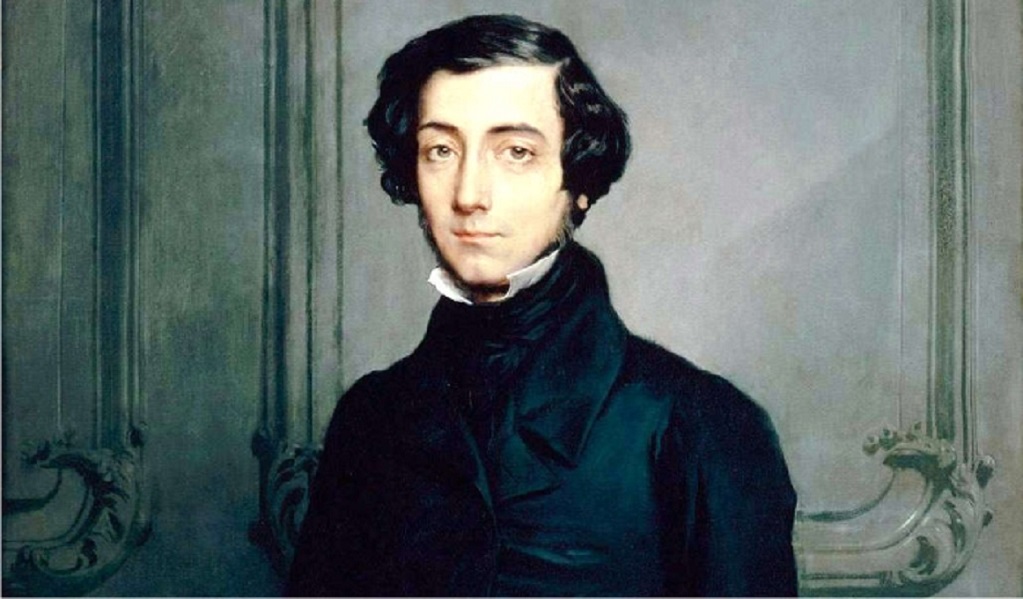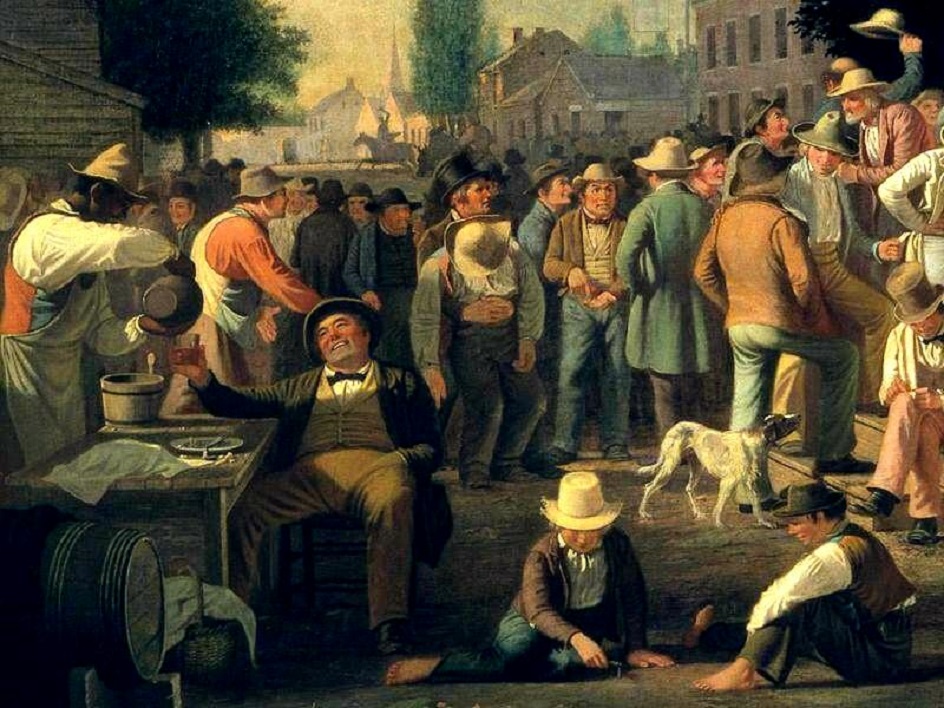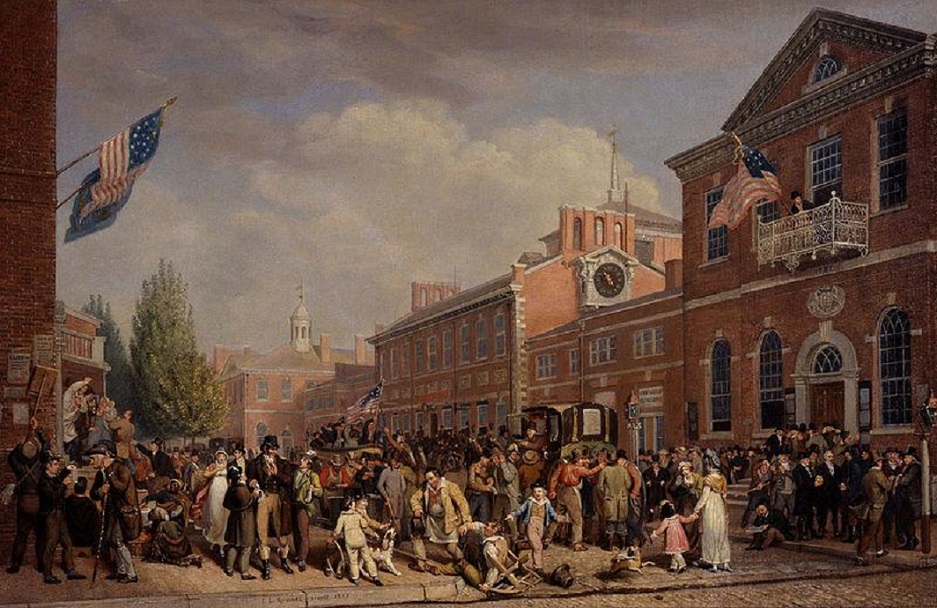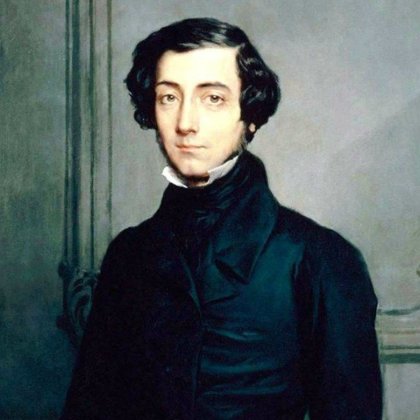ALEXIS DE TOCQUEVILLE WAS A FRENCH ARISTOCRAT,POLITICIAN,HISTORIAN, HE'VE TRAVELLED TO THE UNITED STATES IN 1831.HE WAS BEST KNOWN FOR HIS WORKS DEMOCRACY IN USA.HE BELIEVED THAT DEMOCRACY REPRESENTED THE WAVE OF THE FUTURE.
 Individualism was an inherent part of establishing a new life in
America. Tocqueville, while traveling through the dense woods in
Michigan, in 1831, came across a pioneer and his family, making the
“first step toward civilization in the wilds.”The pioneer and his
family formed a “little world” of their own, an “ark of civilization
lost in a sea of leaves. A hundred paces away the everlasting forest
spread its shade, and solitude began again.” The pioneer had left behind
in Old Europe parents, grandparents, siblings, aunts, uncles, and
cousins, everyone to impede his freedom and independence.
Individualism was an inherent part of establishing a new life in
America. Tocqueville, while traveling through the dense woods in
Michigan, in 1831, came across a pioneer and his family, making the
“first step toward civilization in the wilds.”The pioneer and his
family formed a “little world” of their own, an “ark of civilization
lost in a sea of leaves. A hundred paces away the everlasting forest
spread its shade, and solitude began again.” The pioneer had left behind
in Old Europe parents, grandparents, siblings, aunts, uncles, and
cousins, everyone to impede his freedom and independence.
Democracy was achieved by such a long, arduous and heroic struggle that it can feel embarrassing even shameful to feel a little disappointed by it. We know that at key historical moments people have made profound sacrifices so that we can, every now and then, place a cross next to the name of a candidate on a ballot sheet. For generations across large parts of the world democracy was a secret, desperate hope. But today, we’re likely to go through periods of feeling irritated and bored by our democratically-elected politicians. We’re disappointed by the parties and sceptical that elections make a difference. And yet not to support democracy, to be frankly against democracy, is not a possible attitude either. We appear to be utterly committed to democracy and yet constantly disappointed and frustrated by it.. But for equality their passion is ardent, insatiable, incessant, invincible: they call for equality in freedom; and if they cannot obtain that, they still call for equality in slavery.Alexis de Tocqueville’s ‘Democracy in America’ is a ground breaking study on the nature of modern democracy. The two volumes combine to present a picture of the benefits and dangers of democratic systems, taking the United States as a basis but making conclusions that are universally applicable.Alexis de Tocqueville was a young French aristocrat who visited the United States in 1831 and 1832, ostensibly to study the American penitentiary system. After traveling across the country and conducting more than two hundred interviews with Americans of all classes, he returned to France to meditate on what he had seen and heard. He then recorded his reflections in two volumes, the first published in 1835 and the second five years later.When, in 1831, Alexis de Tocqueville came to study Democracy in America, the trial of nearly a half-century of the working of our system had been made, and it had been proved, by many crucial tests, to be a government of “liberty regulated by law,” with such results in the development of strength, in population, wealth, and military and commercial power, as no age had ever witnessed.De Tocqueville had a special inquiry to prosecute, in his visit to America, in which his generous and faithful soul and the powers of his great intellect were engaged in the patriotic effort to secure to the people of France the blessings that Democracy in America had ordained and established throughout nearly the entire Western Hemisphere. He had read the story of the French Revolution, much of which had been recently written in the blood of men and women of great distinction who were his progenitors; and had witnessed the agitations and terrors of the Restoration and of the Second Republic, fruitful in crime and sacrifice, and barren of any good to mankind.He had just witnessed the spread of republican government through all the vast continental possessions of Spain in America, and the loss of her great colonies. He had seen that these revolutions were accomplished almost without the shedding of blood, and he was filled with anxiety to learn the causes that had placed republican government, in France, in such contrast with Democracy in America.De Tocqueville was scarcely thirty years old when he began his studies of Democracy in America. It was a bold effort for one who had no special training in government, or in the study of political economy, but he had the example of Lafayette in establishing the military foundation of these liberties, and of Washington, Jefferson, Madison, and Hamilton, all of whom were young men, in building upon the Independence of the United States that wisest and best plan of general government that was ever devised for a free people.He found that the American people, through their chosen representatives who were instructed by their wisdom and experience and were supported by their virtues – cultivated, purified and ennobled by self-reliance and the love of God – had matured, in the excellent wisdom of their counsels, a new plan of government, which embraced every security for their liberties and equal rights and privileges to all in the pursuit of happiness. He came as an honest and impartial student and his great commentary, like those of Paul, was written for the benefit of all nations and people and in vindication of truths that will stand for their deliverance from monarchical rule, while time shall last.A French aristocrat of the purest strain of blood and of the most honorable lineage, whose family influence was coveted by crowned heads; who had no quarrel with the rulers of the nation, and was secure against want by his inherited estates; was moved by the agitations that compelled France to attempt to grasp suddenly the liberties and happiness we had gained in our revolution and, by his devout love of France, to search out and subject to the test of reason the basic principles of free government that had been embodied in our Constitution. This was the mission of De Tocqueville, and no mission was ever more honorably or justly conducted, or concluded with greater eclat, or better results for the welfare of mankind.His researches were logical and exhaustive. They included every phase of every question that then seemed to be apposite to the great inquiry he was making.The judgment of all who have studied his commentaries seems to have been unanimous, that his talents and learning were fully equal to his task. He began with the physical geography of this country, and examined the characteristics of the people, of all races and conditions, their social and religious sentiments, their education and tastes; their industries, their commerce, their local governments, their passions and prejudices, and their ethics and literature; leaving nothing unnoticed that might afford an argument to prove that our plan and form of government was or was not adapted especially to a peculiar people, or that it would be impracticable in any different country, or among any different people.The pride and comfort that the American people enjoy in the great commentaries of De Tocqueville are far removed from the selfish adulation that comes from a great and singular success. It is the consciousness of victory over a false theory of government which has afflicted mankind for many ages, that gives joy to the true American, as it did to De Tocqueville in his great triumph. The Germans, Swedes, Norwegians, Danes, Italians, Greeks, Poles, Ukrainians, and Hungarians who emigrated to America seemingly had nothing in common with the original Anglo-Saxon colonists or between themselves, but surprisingly what bound all inhabitants of America together were three common values materialism, equality, and individualism.Except for an exceeding small number of individuals, the 37 million immigrants to America from 1850 to 1929 did not seek religious freedom or the absence of political oppression to write poetry. These immigrants, like my parents, Romanian gypsies, born in a Transylvanian village and raised in thatched-roofed houses with dirt floors, sought economic well-being, and in this regard were not different from the colonists described by Tocqueville. “The wonders of inanimate nature leave them [the colonists] cold, and, one may almost say, they do not see the marvelous forests surrounding them until they begin to fall beneath the ax. What they see is something different. The American people see themselves marching through wildernesses, drying up marshes, diverting rivers, peopling the wilds, and subduing nature.” The New World was seen as a source of unlimited wealth; a view that persisted for at least a century, when Europeans, Latin Americans, and Asians told themselves that “in America, the streets are paved with gold.”
 The County Election' painted in 1852 gives a good idea as to how
election day looked like at mid-century. At the time not all elections
were held on the same day in November.The American democratic system in progress. The story takes
place in a small Midwestern town in the mid-nineteenth century, when the
rituals of voting were still taking shape, particularly on the
frontier. In The County Election, Bingham presents a raucous voting
party as an enactment of democracy, bringing together a variety of
residents in a rural community to make decisions for the common good.
The County Election' painted in 1852 gives a good idea as to how
election day looked like at mid-century. At the time not all elections
were held on the same day in November.The American democratic system in progress. The story takes
place in a small Midwestern town in the mid-nineteenth century, when the
rituals of voting were still taking shape, particularly on the
frontier. In The County Election, Bingham presents a raucous voting
party as an enactment of democracy, bringing together a variety of
residents in a rural community to make decisions for the common good.
Tocqueville believed that democracy represented the wave of the future, and he admired a great deal of how it functioned in the United States, but he found cause for concern as well. As he wrote in the introduction to volume II, “Since I am firmly of the opinion that the democratic revolution to which we are witness is an irresistible fact, and one that it would be neither desirable nor wise to oppose, some readers may be surprised to discover how often I find occasion in the book to be quite severely critical.” It is best, then, to think of Tocqueville as a sympathetic critic of American democracy, and that is how he wanted his readers at the time to perceive him. And so when American readers rushed to buy Democracy in America in translation, they found more than a few observations that were less than flattering. An example would be Tocqueville’s chapter on “Parties in the United States” in volume I, part II. The author began by defining two categories of political parties. “Great parties” are those that “dedicate themselves more to principles than to consequences” and to ideas more than specific leaders. “Such parties generally have nobler features, more generous passions, more genuine convictions, and a franker, bolder manner than others.”When De Tocqueville wrote, we had lived less than fifty years under our Constitution. In that time no great national commotion had occurred that tested its strength, or its power of resistance to internal strife, such as had converted his beloved France into fields of slaughter torn by tempests of wrath.He had a strong conviction that no government could be ordained that could resist these internal forces, when, they are directed to its destruction by bad men, or unreasoning mobs, and many then believed, as some yet believe, that our government is unequal to such pressure, when the assault is thoroughly desperate.Had De Tocqueville lived to examine the history of the United States from 1860 to 1870, his misgivings as to this power of self- preservation would, probably, have been cleared off. He would have seen that, at the end of the most destructive civil war that ever occurred, when animosities of the bitterest sort had banished all good feeling from the hearts of our people, the States of the American Union, still in complete organization and equipped with all their official entourage, aligned themselves in their places and took up the powers and duties of local government in perfect order and without embarrassment. This would have dispelled his apprehensions, if he had any, about the power of the United States to withstand the severest shocks of civil war. Could he have traced the further course of events until they open the portals of the twentieth century, he would have cast away his fears of our ability to restore peace, order, and prosperity, in the face of any difficulties, and would have rejoiced to find in the Constitution of the United States the remedy that is provided for the healing of the nation.De Tocqueville examined, with the care that is worthy the importance of the subject, the nature and value of the system of “local self-government,” as we style this most important feature of our plan, and (as has often happened) when this or any subject has become a matter of anxious concern, his treatment of the questions is found to have been masterly and his preconceptions almost prophetic.In his introductory chapter, M. De Tocqueville says: “Amongst the novel objects that attracted my attention during my stay in the United States, nothing struck me more forcibly than the general equality of conditions.” He referred, doubtless, to social and political conditions among the people of the white race, who are described as “We, the people,” in the opening sentence of the Constitution. The last three amendments of the Constitution have so changed this, that those who were then negro slaves are clothed with the rights of citizenship, including the right of suffrage. This was a political party movement, intended to be radical and revolutionary, but it will, ultimately, react because it has not the sanction of public opinion.If M. De Tocqueville could now search for a law that would negative this provision in its effect upon social equality, he would fail to find it. But he would find it in the unwritten law of the natural aversion of the races. He would find it in public opinion, which is the vital force in every law in a free government. This is a subject that our Constitution failed to regulate, because it was not contemplated by its authors. It is a question that will settle itself, without serious difficulty. The equality in the suffrage, thus guaranteed to the negro race, alone – for it was not intended to include other colored races creates a new phase of political conditions that M. De Tocqueville could not foresee. Yet, in his commendation of the local town and county governments, he applauds and sustains that elementary feature of our political organization which, in the end, will render harmless this wide departure from the original plan and purpose of American Democracy. “Local Self-Government,” independent of general control, except for general purposes, is the root and origin of all free republican government, and is the antagonist of all great political combinations that threaten the rights of minorities. It is the public opinion formed in the independent expressions of towns and other small civil districts that is the real conservatism of free government. It is equally the enemy of that dangerous evil, the corruption of the ballot-box, from which it is now apprehended that one of our greatest troubles is to arise.The voter is selected, under our laws, because he has certain physical qualifications age and sex. His disqualifications, when any are imposed, relate to his education or property, and to the fact that he has not been convicted of crime. Of all men he should be most directly amenable to public opinion.The test of moral character and devotion to the duties of good citizenship are ignored in the laws, because the courts can seldom deal with such questions in a uniform and satisfactory way, under rules that apply alike to all. Thus the voter, selected by law to represent himself and four other non-voting citizens, is often a person who is unfit for any public duty or trust. In a town government, having a small area of jurisdiction, where the voice of the majority of qualified voters is conclusive, the fitness of the person who is to exercise that high representative privilege can be determined by his neighbors and acquaintances, and, in the great majority of cases, it will be decided honestly and for the good of the country. In such meetings, there is always a spirit of loyalty to the State, because that is loyalty to the people, and a reverence for God that gives weight to the duties and responsibilities of citizenship.M. De Tocqueville found in these minor local jurisdictions the theoretical conservatism which, in the aggregate, is the safest reliance of the State. So we have found them, in practice, the true protectors of the purity of the ballot, without which all free government will degenerate into absolutism.In the future of the Republic, we must encounter many difficult and dangerous situations, but the principles established in the Constitution and the check upon hasty or inconsiderate legislation, and upon executive action, and the supreme arbitrament of the courts, will be found sufficient for the safety of personal rights, and for the safety of the government, and the prophetic outlook of M. De Tocqueville will be fully realized through the influence of Democracy in America. Each succeeding generation of Americans will find in the pure and impartial reflections of De Tocqueville a new source of pride in our institutions of government, and sound reasons for patriotic effort to preserve them and to inculcate their teachings. They have mastered the power of monarchical rule in the American Hemisphere, freeing religion from all shackles, and will spread, by a quiet but resistless influence, through the islands of the seas to other lands, where the appeals of De Tocqueville for human rights and liberties have already inspired the souls of the people.The rise of democracy did not by itself explain the decline of respect for intellect. The partisan conflicts of the 1790s did as much damage. Alleging conspiracies to aid revolutionary France, designs to undermine Christianity, and plots to restore monarchical government, members of the founding generation employed any rhetorical strategy, however indecent or dishonest, to discredit their rivals. Although few were immune, Thomas Jefferson was the first serious victim of the comprehensive assault on intellect. When, in 1796, it appeared that Jefferson had positioned himself to succeed George Washington, William Loughton Smith, a Federalist congressman from South Carolina, published a pamphlet denouncing Jefferson’s qualifications for office. Smith lamented that Jefferson was a philosopher with a skeptical and speculative mind, which had rendered him an atheist who possessed neither faith nor morals. As an even more damning criticism, Smith asserted that Jefferson was a poser, not a genuine philosopher at all. His learning was sophistical, inferior, and debased. As a consequence, his mind displayed “a want of steadiness, a constitutional indecision and versatility, visionary, wild, and speculative systems, and various other defective features.” As president, Jefferson was almost certain to be abstract and theoretical, timid and arbitrary, impractical and frivolous, indecisive yet doctrinaire, hardly the qualities of mind or character to inspire confidence in a head of state. “I am ready to admit,” conceded another Federalist critic, “that he is distinguished for shewy talents, for theoretic learning, and for elegance of his written style.” Jefferson’s abilities better suited him for a professorship than for the presidency.The campaign against Jefferson, in conjunction with the Alien and Sedition Acts that targeted dissidents and foreigners, revealed that the patrician Federalists had abandoned their commitment to tolerance and freedom. That occurrence alone justified, or at least helped to explain, the popular rejection of the Federalist Party after 1800. At the same time, the advocates of democracy compiled an equally uninspiring record. By the 1820s, the democratic movement was lapsing into a rabid populism that was antagonistic to the scholar, the man of letters, and the gentleman. Lauding the virtues of the common man, democratic populists were apprehensive about the intentions of the propertied and cultivated to dominate government. In time, what had originated as prudent anxiety devolved into a suspicion of learning itself. As early as 1788, Amos Singletary, a delegate to the Massachusetts Constitutional Convention, had objected that.The Ways in Which America is a Democracy and the Ways in Which America is a Republic.One reason people get confused about whether America is a Republic or Democracy is because the U.S. has a complex mixed-government with many democratic and republican feature.
 When French aristocrat Alexis de Tocqueville surveyed the United States,
he made an observation that would make any American newsperson swoon
for the good old days of 1831. “Nothing is easier than to set up a
newspaper,” he wrote “as a small number of subscribers suffices to defray the expenses.” Eerily, Tocqueville’s worst fear about what awaited American life in the
future seems fulfilled. He predicted that a blind commitment to
equality would result in an America where “an innumerable multitude of
men, all equal and alike, constantly circling around in pursuit of the
petty and banal pleasures with which they glut their souls. Each of
them, withdrawn into himself, is almost unaware of the fate of the rest.
Mankind, for him, consists in his children and his personal friends. As
for the rest of his fellow citizens, they are near enough, but he does
not notice them. He touches them but feels nothing. He exists in himself and for himself.
When French aristocrat Alexis de Tocqueville surveyed the United States,
he made an observation that would make any American newsperson swoon
for the good old days of 1831. “Nothing is easier than to set up a
newspaper,” he wrote “as a small number of subscribers suffices to defray the expenses.” Eerily, Tocqueville’s worst fear about what awaited American life in the
future seems fulfilled. He predicted that a blind commitment to
equality would result in an America where “an innumerable multitude of
men, all equal and alike, constantly circling around in pursuit of the
petty and banal pleasures with which they glut their souls. Each of
them, withdrawn into himself, is almost unaware of the fate of the rest.
Mankind, for him, consists in his children and his personal friends. As
for the rest of his fellow citizens, they are near enough, but he does
not notice them. He touches them but feels nothing. He exists in himself and for himself.
